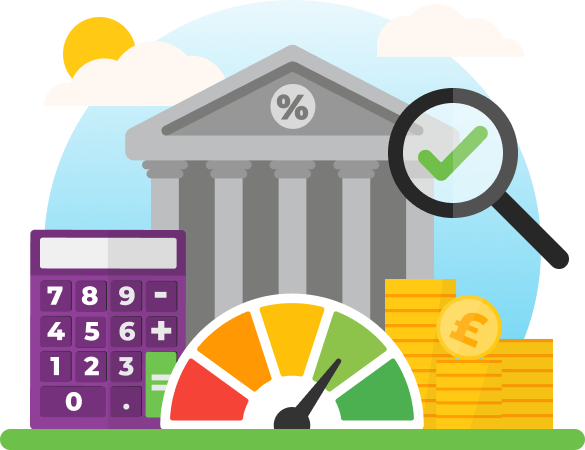A mortgage is a loan to buy property or land. You’ll need to pay back the amount you borrowed (the capital) plus interest.
You are unlikely to get a mortgage for the full value of the property you plan to buy. Usually, at least 5% of the property’s value will need to be put down as a deposit. The rest will be the mortgage (e.g. 95% of the value).
Most mortgages have terms of 25 to 35 years, although this can be shorter or longer. Your mortgage will be secured against the value of your property until the whole sum of the loan is paid off.
This means that if you're unable to keep up with repayments, your mortgage provider could repossess the property.
You can get a mortgage from a lender such as:
- A bank
- A building society
- A specialist mortgage lender
A conveyancing solicitor will liaise with your mortgage provider to help with the legal aspects of buying a house. We’ve compiled a guide on the different types of mortgages and how to apply for one. Be aware that this guide is for informational purposes only and does not constitute financial advice.
What is Loan-to-Value?
Loan-to-value (LTV) is how much of the property’s value you borrow as a mortgage. For example, if you bought a property for £200,000 and put down a 10% (£20,000) deposit and borrowed £180,000 as a mortgage, your LTV would be 90% (£180,000 being 90% of £200,000).
The lower your LTV, and the bigger your deposit, the more mortgage deals you’ll have access to and the cheaper they will be.
The best mortgage deals normally have a maximum LTV of 60%. Lenders used to offer 100% mortgages but these deals are very rare.
What is Remortgaging
Remortgaging is when you take out a new mortgage to pay off an existing one. Borrowers normally remortgage to benefit from a lower interest rate. You might find that your LTV is different when you remortgage.
This is because the value of your home might have changed. Going back to the above example, if you remortgage after five years you might find your property is now worth £250,000. If you took out a new £180,000 mortgage to pay off the existing one, it would be 72% of the property’s value. This could mean you are eligible for cheaper mortgage deals than before when your LTV was 90%.
Some people remortgage to release equity. In the above example, you could take out a £200,000 mortgage, pay off the £180,000 mortgage and have £20,000 in cash.
To learn more, read Do You Need a Solicitor to Remortgage?

Compare Mortgage Brokers
Accredited mortgage brokers
Used by over 1.5 million movers in the UK
How to Apply for a Mortgage
You can either apply for a mortgage directly from a bank or building society, or via a mortgage broker or independent financial adviser. Many buyers choose to begin their mortgage application before starting their property search, as this can help avoid delays during the conveyancing process.
Mortgage from Bank or Building Society
Some banks offer their current account customers special mortgage deals. It's important to compare these mortgages against what is available elsewhere – they won’t necessarily be the best mortgage for you.
It’s important to understand that if you speak to a mortgage adviser at a bank or building society they will only advise you on mortgages offered by that particular lender, not other lenders’ mortgages.
Mortgage Broker
Mortgage brokers may be able to access deals across a wider range of lenders and can help with the application process. They will offer impartial advice and provide you with a range of choices, whereas a bank can only offer you its own mortgage deals. They can also assess any and all factors that may stop you from getting a mortgage.
While mortgage brokers often charge a fee, some people find that the access to a broader range of mortgage deals or support with the process can be helpful.
Read more on Mortgage Broker vs Bank: Which Is Right for You?
What Do You Need to Get a Mortgage
To prepare for a mortgage interview with a lender, you'll usually need the following documents:
Form of ID
Proof of address
Employment details
Three to six months of bank statements
Payslips as proof of salary
Utility bills

Compare Mortgage Brokers
Accredited mortgage brokers
Used by over 1.5 million movers in the UK
What is a Tracker Mortgage?
A tracker mortgage usually tracks the Bank of England base interest rate. This is known as the “base rate” or “bank rate”.
Usually, the Bank of England holds a meeting to decide the base rate every month. It sometimes holds extra meetings to change the base rate at other times.
A tracker mortgage will normally be the base rate plus a certain percentage. For example, it might be base rate plus 1%. So if the base rate is 0.5%, you’ll pay 1.5%. So if the base rate goes up to 0.7%, you’ll pay 1.7%. If it goes down to 0.2%, you’ll pay 1.2%. How much interest you are charged will affect how much you pay each month.
A key advantage of tracker mortgages is that you benefit from any fall in the base rate. But the downside is that your payments will go up if the base rate goes up.
Some tracker mortgages are “lifetime” trackers which last for the entire mortgage term. Others will be for two to five years, after which they will revert to the lender’s standard variable rate (SVR).
What is a Standard Variable Rate Mortgage?
Each mortgage lender has its own standard variable rate (SVR). While a lender’s SVR often moves in line with the Bank of England base rate, the lender can increase or decrease the rate whenever it wants. This means the amount of interest you pay on your mortgage, and therefore your payments, can change from month to month.
Many people choose to remortgage when they are on their lender’s SVR, as SVRs often have higher interest rates than fixed deals. Whether this is the right option depends on your individual circumstances.
What is an Offset Mortgage?
An offset mortgage allows you to “offset” savings held with the same lender, and not pay interest on that amount.
For example, if you had a £100,000 mortgage and £20,000 in savings, offsetting would mean you just pay interest on £80,000. This would mean lower monthly mortgage repayments.
However, you would not earn interest on your savings. An offset mortgage saves you money by reducing the amount of capital you pay interest on. Some lenders also allow you to offset money in your current account.

Compare Mortgage Brokers
Accredited mortgage brokers
Used by over 1.5 million movers in the UK
What is a Mortgage in Principle
A mortgage in principle is a lender's word that it would, in theory, lend you a certain amount of money. This will help you look more serious as a buyer and can work in your favour when making an offer on a house.
A mortgage in principle isn't a guarantee of how much a lender can offer you and your application could still be declined. The mortgage in principle will usually last between 60 and 90 days.
Once the mortgage itself is approved, you are given a certain amount of time for which the mortgage offer is valid. We have a complete guide on what happens after mortgage offer including what to do if your mortgage offer is withdrawn.
The Advantages of a Mortgage
To prepare for a mortgage interview with a lender, you'll usually you'd need the following:
Allows You to Buy a House
A mortgage is the only way many people can afford to buy a house. Without a mortgage you’d need to have the full purchase price of the property in cash.
You'll be a Homeowner
The main advantage of taking out a mortgage will be owning your home at the end of it.
More Beneficial Than Renting
Although renting a house can sometimes be cheaper, with a mortgage, you’re paying money towards owning your home instead of straight to a landlord.
The Disadvantages of a Mortgage
Interest Rates
You’ll pay interest on the amount you borrow if you take out a mortgage. This means that over the course of the 25 to 35 years, you pay back a lot more than the original price of the house.
Potential Decrease in Property Value
If house prices fall, your home could be worth less than you paid either during the mortgage term, or at the end of the mortgage term.
Debt
A mortgage loan is a substantial amount of money and will be the highest debt most people have to pay in their lifetimes.


